DO-IT News April 1999

Volume 7, Number 1
Below are the articles of the DO-IT News April 1999 newsletter. These articles can also be seen all on one page at the Full Newsletter option.
Director's Digressions
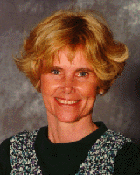
Congratulations '98 Scholars
Phew! The sixth annual Summer Study programs last summer were a great success. Forty high school students with disabilities from across the United States and one from Canada joined DO-IT staff, veteran Scholars, and Mentors at the University of Washington to learn about college life, technology, and career strategies. One group of twenty new Scholars was supported by our new funding source, the state of Washington. A second group of twenty, as well as Phase II returning Scholars, were supported by our last year of DO-IT Extension funding from the National Science Foundation. We're sad to report that, unless a funding source is located, the 1998 Scholars will be the last group of students recruited from around the country, but happy to report that Washington will continue to support Scholars in that state. I introduced you to some of the '98 Scholars in the July 1998 issue of DO-IT News. Here are the rest of them.
Katrina hails from Kenmore, Washington and is interested in art, history, and science. Katrina has a brain injury. "I process information slowly, however, I can assimilate and retain new material."
Eddie is interested in "how things work and likes to figure out how to do things." Eddie set his sights on becoming an engineer or an architect. Eddie has a learning disability and enjoyed meeting others with LD, sharing ideas about how to improve their reading and strategies for success. Eddie is from Spokane, Washington.
Matt "loves to correspond with others and learn from others." He joins us from Oroville, Washington where he enjoys solving algebra problems and won a letter in the Knowledge Bowl. His goal is to be a programmer. "Having a computer and Internet access has been really great because I write really slow, but I can type really fast." Matt's disability is spinal muscular atrophy.
Chris is from Redmond, Washington and has as a career goal to work as a scientist for NASA. He also enjoys "chatting, hanging out with friends, playing pool, and cracking jokes." Chris has dyslexia, ADD, and dysgraphia.
Chanon, who joins us from Neenah, Wisconsin, has cerebral palsy. Her interests include the study of living organisms. "I am intrigued on how they run their course in life." She plans to attend a home-state university and major in psychology.
Marissa lives in Des Moines, Washington and plans to become a computer programmer and writer. Marissa has cerebral palsy. She is a motivated student who has won the President's Award and an Honor's Award and loves to e-mail new friends in DO-IT.
Crystal lives in Portland, Oregon. Problem solving is her passion. Math is one of her favorite subjects. Crystal, who has a visual impairment, hopes to one day graduate from college and become a lawyer or a counselor. "Either way, I'll be making a difference in people's lives and that's what I want to do."
Justin lives in Woodinville, Washington. He has cerebral palsy and uses adaptive technology to do his school work on a computer. Justin wants to be a computer programmer for Microsoft. "I feel great about meeting other people with disabilities and corresponding with other people because I want to know what is out there for handicapped people."
John-Paul is from Clarkston, Washington and would like to go to college to study engineering or architecture. John, who has spina bifida, says "I think that the DO-IT program is a good opportunity to meet other people who are headed in the same direction in life and who face similar challenges because of a disability."
Reginald, from Albany, Georgia is an experienced computer user, but loves to learn about advanced applications. Reginald, who has ADHD, enjoys meeting new people and experiencing college life through DO-IT. He plans to become a physical or occupational therapist.
Khrystal joins us from Spokane, Washington. She has a specific learning disability and math is her favorite subject. One of her goals is to be the first in her family to attend college. In DO-IT she has met new people her age that have similar interests.
Michael, from Alberta, Canada, is our first international Scholar. His disabilities are LD, ADHD, neuromotor deficits, and Dysgraphia. Michael is an honors student and enjoys participating in science fairs, volunteering in his community, and working with computers. His career goal is to be a pediatric psychiatrist.
Silas, from LaConner, Washington, would someday like to program or design computer games. Silas, who is visually impaired, is a motivated student. Through the DO-IT program, he is learning "how others with similar disabilities cope and adapt" and "about new hardware, software, and adaptations for the vision impaired."
Jessie lives in Seattle, Washington and has aspirations to go to college and study science or medicine. "Science is a puzzle. I like to see the outcome of a problem or experiment." Jessie has dyslexia and ADD and is active in sports; she received a varsity letter in cross-country. She also enjoys dancing, classical ballet, and skiing.
Todd is from Bothell, Washington and would like to attend the University of Washington when he completes high school. He wants to either write music or program computer games. Todd has ADD and excels in math, science, and music. He is excited to learn more about computer technology through DO-IT and to hang out on the UW campus.
Arnell comes to us from Port Orchard, Washington. Arnell enjoys inventing and creating things with his hands. He has ADHD and speech-communication problems. "The computer and the Internet help me to do schoolwork." In DO-IT, he has made new friends and learned more about the Internet.
Nichole lives in Sumner, Washington and is an honor student at her high school. She enjoys astronomy, math, and art. Nichole, who uses a wheelchair, wants to be an attorney or a scientist one day. "The DO-IT program will help to give me physical independence and college experience."
Lindsay is from Spokane, Washington. She loves animals and plans to apply her passion as a zoologist. Her disabilities impair her hearing and learning. Lindsay is excited to learn more about computers.
Corey lives in Seattle and when he graduates high school, would like to attend the University of Washington and study chemical engineering. He is a motivated student and a skilled computer user. Corey has Tourette's dyndrome, obsessive-compulsive disorder, and epilepsy. "The single most important benefit of my computer usage is that it allows my teachers to read my assignments - my handwriting and spelling are atrocious."
Abe comes from Edmonds, Washington and has a visual impairment. His career goal is to become a paleontologist. "I enjoy physical science, especially working with magnets, exploring physical laws, and studying explosions."
Jessie is working hard in school so she can attend a college or university. Washington is her home. Jessie, who has cerebral palsy, thinks she might one day pursue a career in space sciences. She enjoyed getting a trial run at college life through DO-IT and meeting other Scholars.
You Can DO-IT, Too!
Are you or someone you know interested in one of the most exciting learning experiences offered outside a virtual reality haven? If so, you will be interested in what DO-IT can do for you.
We are actively recruiting Washington state college-bound high school freshmen, sophomores, and juniors with disabilities to participate in the DO-IT Scholars program. We are particularly interested in attracting students who will become leaders in helping others with disabilities achieve success. The DO-IT Scholars program is funded by the state of Washington. In previous years, we have accepted Scholars from outside of Washington state through a generous grant from the National Science Foundation. We are now actively seeking funding to continue the national outreach. If successful, we will be able to once again accept Scholars outside of Washington state in the summer of the year 2000.
Participants accepted into the 1999 DO-IT Scholars will attend their first live-in summer program at the University of Washington August 3-13, 1999. Those accepted into the 2000 program will attend their first summer program in 2000. If not already available, Scholars will be loaned computer systems that they keep in their homes. They gain access to the Internet network to obtain information to pursue their studies and to communicate with staff, Scholars, and Mentors. They communicate year-round, return to the UW for a second Summer Study program and have opportunities to participate in internships and other worthwhile experiences. As Scholars move on to college, they become DO-IT Ambassadors, sharing their experiences with the younger Scholars. Still not convinced that this is the best program going? Let some of the 1998 DO-IT Scholars and Ambassadors share a few thoughts on the program:
- "It was a blast making slime."
- "I especially liked the Wild Web World session."
- "You are trying to help us find a job and how to do it and I really like that!"
- "I really enjoyed the trip to the Pacific Science Center, along with the Museum of Flight."
- "The dance evening was the most fun."
- "I learned how to ask for accommodations from the DSS (Disabled Student Services) office, and how to approach professors about specific accommodations that they can deal with in their own classes."
- "It was a BLAST, especially Microsoft."
- "I feel less concerned about attending college, because I know that there will be people willing to help me if I advocate for myself and ask for what I need."
- "I know that I can live on my own now."
Contact the DO-IT office for application information.
President Clinton Honors Mentoring Award Winners
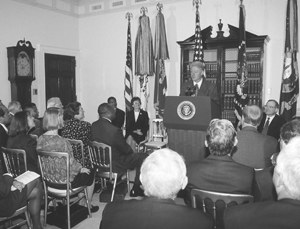
The University of Washington was honored for the second year in a row with Presidential Awards for Excellence in Science, Mathematics and Engineering Mentoring. DO-IT won this award in 1997. This year award-winners included Dr. Aubrey Gorbman, retired UW professor who continues to mentor young researchers. The UW Women in Science and Engineering (WISE) program won a mentoring award as well.
Sponsored by the White House Office of Science and Technology Policy and the National Science and Technology Council, this award recognizes outstanding programs for mentoring underrepresented groups in science, mathematics and engineering fields. The award includes a $10,000 grant, which DO-IT used to create a videotape and brochure titled Opening Doors: Mentoring on the Internet (available for $25 from DO-IT).
Now in its third year, the Presidential Award is an outgrowth of President Clinton's 1994 science policy blueprint, Science in the National Interest, which outlined two goals: to produce the best trained scientists and engineers for the 21st century and to enhance the scientific and technological literacy of all Americans. Addressing the winners, President Clinton underscored the importance of the encouragement mentors give to young people from underrepresented groups-women, ethnic/racial minorities, people with disabilities. "If we're serious about having the best scientists and engineers in the world," he said, "we can't leave anyone behind."
Just DO-IT, Spokane!
DO-IT has expanded into eastern Washington with the opening of a new satellite office. It is located near downtown Spokane, in the Easter Seals/WATA (Washington Assistive Technology Alliance) office building. The new office has one DO-IT staff member, me (Lyla Crawford). Easter Seals supports an adaptive technology lab at this site which allows DO-IT staff to provide enhanced adaptive technology support to DO-IT participants in eastern Washington. The Spokane office has increased the participation of eastern Washington residents in DO-IT activities, including the DO-IT Scholars, Pals and Campers programs. If you know of any groups in eastern Washington who would like to hear more about DO-IT programs please contact me.
DO-IT
West 606 Sharp
Spokane, WA 99201
(509) 328-9331 (Voice/TTY)
(509) 326-2261 (FAX)
lylac@u.washington.edu
DO-IT -Will Share "Lessons Learned"
The Mitsubishi Electric America Foundation has generously awarded the DO-IT program a grant to create and distribute a videotape and accompanying publication that will address the question, "What helps students with disabilities succeed?" Content of the materials will be based on current research and proven practices and will include testimonials by people with disabilities. This project will help students with disabilities learn how they can contribute to their own success and help parents, educators, and service providers promote the success of young people with disabilities. The Mitsubishi Electric America Foundation is a non-profit foundation jointly funded by Mitsubishi Electric Corporation of Japan and its American affiliates with the mission of contributing to a better world for us all by helping young people with disabilities, through technology, to maximize their potential and participation in society. Thank you Mitsubishi Electric America Foundation!
DO-IT's Open Captions Well Received by Pac Rim Visitors
DO-IT recently hosted two groups of visitors who are trying to increase the educational and career opportunities for people with disabilities in their home countries of Taiwan and Japan. Members of each group had limited spoken English skills and required the services of interpreters. However, when it came time to show DO-IT's adaptive technology videotape, the enthusiasm was apparent. Most participants could read English quite well and had no problem following the presentation because it was open captioned. Once again, it is demonstrated how an accommodation made for individuals with disabilities is useful to others.
The first group came in November. Bey-Lih Chang, Ed.D., professor and chair of the Department of Special Education at National Taiwan Normal University, visited DO-IT and the University of Washington Adaptive Technology Lab, with a group of thirty educators. In December, DO-IT hosted a group of delegates from JISA (Japan Information Service Industry Association), an organization representing the information services industry in Japan. Their primary goal is to assist governments and businesses shape and carry out policies which will expedite employment of people with disabilities in Japan. JISA also visited IBM, Microsoft and Stanford University during their stay in the United States. It was exciting to meet these groups and learn about disability issues in other countries.
DO-IT 2-4
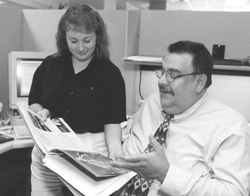
The DO-IT 2-4 project is recruiting students with disabilities in two-year colleges and mentors to join a dynamic electronic discussion list. The purpose of the DO-IT 2-4 group is for students attending two-year colleges to communicate with each other and with mentors. Mentors, who have already made this transition, share their experiences and advice, and offer strategies for a successful and rewarding transition. Some mentors are enrolled in a four-year school, having successfully transitioned from a two-year college; others have since graduated and are now working.
To join the discussion list, send email to listproc@u.washington.edu with "subscribe doit2-4 Firstname Lastname" in the body of the message. Substitute your name for Firstname Lastname, without including quotation marks.
DO-IT '98
Two weeks out of the summer
Twenty kids with special needs
From all over the United States come
To have fun,
Meet new people
And most of all get prepared for their futures
No matter what that may entail.
Many new experiences occur
Many new sights to see
And lots of cool people to meet
Each day more priorities
A bigger schedule to follow
More to do.
Although at first it may be a lot to soak in at once
Lectures, videos, hands-on activities
We all stick together as a whole
And that's what makes DO-IT different
And when the weeks are over
We know that we can DO-IT!
When we leave we'll always remember
That we have great staff
And remember that we had a great time.
Now we can DO-IT
We can get into college
And will eventually have a career.
We went through the first Phase
And we're eager to come back again
Because we'll miss joking with everyone.
Years have passed
High school is gone
Now we'll be in college
Studying hard on our career.
Hopefully it will bring luck in the coming years
The DO-IT program is the best thing we ever did!
Summer Study '98: What Did the Phase I Scholars Do?
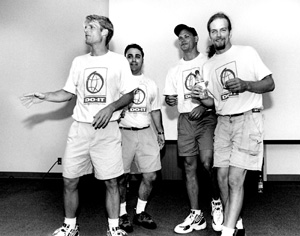
DO-IT Phase I Scholars participate in a two-week, live-in summer study session on the University of Washington campus in Seattle, Washington. They learn about college life; surf the Internet; interact with peers, staff, and mentors; and have fun. Below, '98 Phase I Scholars share some of their experiences. A few more of their articles will appear in the next issue of DO-IT News. Note that, reluctantly, some articles were edited by DO-IT staff to make them short enough to include in this publication. Additional articles by Scholars can be found in earlier newsletters at www.washington.edu/doit/news/do-it-news.
DO-IT with Slime
by DO-IT Scholars, Abe and Todd
The lab that we did, called the slime lab, was a very interesting experience. We went to a chemistry lab and mixed sodium bromide with glue and water. The result was this gooey slime material that was slippery and wet. After the first slime was finished all of the different groups changed a small part of the lab to make different variations to the slime. In one variation the slime was transparent.
Searching the 'Net
by DO-IT Scholars, John and Chris
When conducting a search on the Internet the number of options on the 'Net can be overwhelming. Luckily, there are many places on the 'Net where you can base your search. These sites, called search engines, are databases of different Web sites that are categorized. Search engines are not all the same. Some are better than others.
The search engine Yahoo! is one of the most widely used search tools on the Web. Yahoo! is also much more than a search tool. It has a classifieds section and it has a yellow pages section. We've found that this engine is particularly useful for looking up things that are related to personal interests. Unfortunately, if you use a category search you will probably be bounced around with the many cross links that are throughout the site.
Lycos is a good search engine when you want to search for pictures or sounds or other multimedia and not go through several pages of text to get what you want. The format for the search is pretty easy and the site isn't bogged down by excessive links. The major downside to Lycos is that if you intend to do a search by categories they are presented in a way that the categories sound entertaining and appealing- not too good for a serious search.
The search engine Alta Vista gives you a lot of sites when you search. This is okay if you are planning on spending a lot of time doing your search or if you are good at narrowing down what you plan to search for but if you want to do a quick search you can be easily bogged down at this site.
The most important thing to do when you are using search engines is to familiarize yourself with as many as possible and to learn how to effectively narrow down your search. Don't use a single engine exclusively.
DO-IT Introduces Advanced Web Use
by DO-IT Phase II Scholars, Corey and Reginald
During the '98 Phase I Scholar Summer Study, Dan Comden commissioned a group of experienced Internet users to help redesign the DO-IT home page. The group worked in HTML, performing various tasks, including the addition of education links, and repositioning of the graphic to make the page more aesthetically pleasing, while still maintaining the accessibility features for individuals with various impairments.
Dorm Life-We DID-IT!
by DO-IT Scholars, Eddie and Silas
Last summer at DO-IT was the first time we had ever been in a dorm. We thought it was fun. We were roommates. We kept each other company. The best thing about living in a dorm is that you're on your own and you can do lots of things like stay up late on the phone. No one cares except the person you are talking to, as long as you get up in the morning. It was a good experience because now we know what it's like to go to college and manage on our own. Life doesn't give you all that you need so you have to reach out and grab for things. At first we didn't really understand that but now we do. Dorms aren't perfect so you will have to ask for staff if you need it, but that part of being on your own overall is not as bad as it sounds. We learned a lot of new things-like that the rooms are small and they get cold fast if you leave your fan on all night. The people at the front desk are nice and friendly. If you have a question they always answer it. Dorms are neat and clean. The bathrooms are clean when you go in but they are messy when you leave. The showers are like a high school locker room, with the shower head hitting you in the chin.
Doing Up Our Dorm Room at DO-IT
by DO-IT Scholars, Crystal and Jessie
During the DO-IT program the Scholars stayed in the McCarty Hall dormitory on the University of Washington campus. The boys got one floor and the girls got another. We got room 268 on the second floor. Our room was one of the six rooms on the girls' floor. All of the dorm rooms in McCarty Hall are virtually identical. The dorm room is like a 13' by 17' shoe box. The rooms are made for two people to share so every piece of furniture has a twin next to it. The two cream colored, stair formation beds lay against the wall and opposite of the mirror. The mirror is mounted on the wall on top of a counter. Underneath the counter are two dressers with five drawers each. On both sides of the mirror there are closets to hang clothes in and store luggage in or anything else you need to. There are also two work areas with three-drawers desks. Each has a light above it and a window beside it. The dorm also provided us with a phone with voice messaging and a direct line.
The dorm rooms were very efficient but boring. We, being the creative people we are, couldn't stand the plain white walls. We had to do something. The second night we had this crazy idea to decorate our walls with magazine advertisements. We stayed up late that night tearing out pictures and taping them to our walls. We went crazy. In the end we had a huge collage of colorful pictures covering a big space on two walls. After that we were still not satisfied. Our room was still missing something. Then we had a great idea. One of us had flamingo and palm tree Christmas lights that we strung above our mirror. It was just what we needed to make our room perfect!
The Microsoft Experience
by DO-IT Scholars, David and Wesley
On Friday, August 7, DO-IT Phase I Scholars toured Microsoft. We had an incredible time. Our tour started off with an overview of Microsoft's general information and vision. Here are some of the most astounding statistics we learned: Microsoft is the leading manufacturer of software in the world. There are 25,000 employees that work for Microsoft worldwide. According to Bill Gates, Microsoft's vision is to "have a computer on every desk, in every home, in every school." Microsoft has a serious commitment to disabled employees, according to its benefits manager. They provide such things as special hardware, sign language interpreters, office restructuring and personal assistants. Microsoft reviews its accommodations requests on a case by case basis and has a dedicated staff to deal with requests. However, sometimes an alternative solution that ends up with the same result is offered instead.
Microsoft employees showed DO-IT Scholars accessibility options in Windows 98 and Internet Explorer 4 (IE 4). Microsoft offers accessibility programs free to competitors to help them make their programs accessible as well. Scholars visited the Microsoft Museum. It contains both the history of the computer and of Microsoft. We loved the opportunity to play around with popular Microsoft programs such as Encarta '98 and Microsoft Flight Simulator '98. We enjoyed our time at Microsoft. It was a time to learn and experience what the computer industry has to offer.
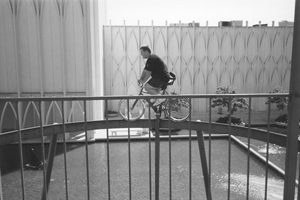
Pacific Science Center
by DO-IT Scholars, Jessie and Maggie
On Saturday August 8, the DO-IT Phase I Scholars participated in an off-campus activity at the Pacific Science Center located in Seattle. During the day, the Scholars participated in various activities. Some activities were done as a group, like the IMAX and laser shows. Others were done in smaller groups, such as visiting the Space Needle, and other attractions.
Shortly after arriving the Scholars attended an IMAX movie presentation entitled "Alaska." The movie focused on the affects of nature and wildlife due to change of the season. The large screen provided a realistic feeling for the audience. After the IMAX presentation the Scholars attended a laser show. The theme of the show focused on space. Many Scholars had different opinions about the show. Some felt that it was very entertaining and exciting while others were dizzy and nauseated.
Next, many of the Scholars decided to tour the Space Needle. "The view from the observation deck was spectacular," says Maggie, a Phase I Scholar. While the Space Needle is a very popular attraction, it may be challenging for people with mobility impairments to enjoy the entire view. Unfortunately, the observation deck outside is not accessible to wheelchairs.
The Phase I Scholars had a fun-filled day at the Pacific Science Center and other attractions near the Science Center.
Finding Your Rainbow
by DO-IT Scholars, Jeff and Landon
On Wednesday, August 5, Grahman Allen talked to the Phase I Scholars on "Finding Your Rainbow" which means finding your own road to success. He challenged us to be creative. We all are individuals and our thoughts are the sum of our own experiences and no one else has the same experiences. Often the greatest inventions come from the simplest thoughts and needs. When developing a concept, you should be able to answer any questions that arise. Think like a journalist, asking yourself "who, what, where, when, why and how." If you can answer all of these questions, you may have come up with a creative, innovative concept. People are impulsive and only think for a few minutes each day. Don't let what you can't do get in the way of what you can do. Being creative and innovative is something we all can do and for which companies will pay top dollar.
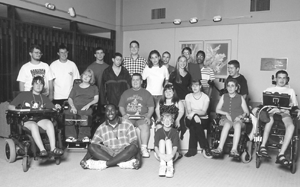
Museum of Flight
by DO-IT Scholars, Ivan and Dustin
As we drove down Interstate 5 from downtown Seattle to south of the city we peered into the sky and saw as many as six of the best top gun pilots in the air above. These flying aces maneuvered above our heads as if they were majestic eagles. The Blue Angels are a sign of America's air strength. Boeing International airfield is a temporary home to these F-18s during Seattle's SeaFair Celebration. Boeing is the top airplane manufacturing company in the world. It also houses a museum on its property along with most of the manufacturing plants, a runway and hangars.
We pulled up to the museum, a large red barn connected to a more contemporary building, and climbed out of the charter buses into a large plaza. The staff had a box lunch prepared for each of us, a fulfilling meal in hand. We entered the buildings large glass doors using our bright yellow pins to get passed the guards. We met up with an older gentleman who led us on a one-hour tour of the facilities, during which time he provided us with interesting information regarding the history and technical variations on the assorted planes which were on display throughout the museum.
A true variation of planes and helicopters were strewn across two levels and hanging jets. The sky level featured glider and other lightweight flying contraptions as well as a helicopter. The ground level had neatly placed fighter jets and older flyers. The ground level also featured a flight simulator. For three dollars you could sit in a box with nine others and be tossed around like a bag of potatoes. This was a sorry excuse for an amusement ride, well for three bucks that is. The bottom level held the crowned jewel of the museum, a blackbird spy plane. An interesting thing was the car plane that could be a plane or a car in just a matter of minutes. Unfortunately it never hit the market.
For a comprehensive history of air travel and pioneer aviators, we entered a large red barn which had been previously owned by the Boeing company. This contained bio sketches of early men and women of flight, as well as some prototype engines and other mechanisms related to planes.
In remembrance of our venture at the museum of flight we browsed the full and complete gift shop, purchasing mementos for our friends and families. All in all, this visit was one of the highlights of our trip to Seattle.
The Heart of It
by DO-IT Scholars, Justin and John
We started the day by doing the usual routine, eating breakfast, going to the HUB computer lab, checking our e-mail, and returning mail to others. The day is August 11. At about 11:00 am we headed for the Mechanical Engineering Building, just down from the HUB. There we met our science instructor, Laurie Clark.
She started out by telling us her past-who she is, what she does. Then she said, "Today we are going to perform three tasks on a heart that came from a sheep: first is a bypass, second is a valve replacement, and third is to explain what blue baby syndrome is." We were not in the same group, but we both had the experience of doing it. It was fun, wet, slimy, gooey, and we liked it very much. We first did the bypass from one of the arteries to the biggest artery on the heart. We took a tube and bypassed it to the biggest artery on the heart, cut a hole in the side of it and stuck the tube through it, bypassing the tube from one of the arteries to the other. When we were done it looked like a purse for doctors.
Second, we had to replace a valve in the heart. First we had to make a 1- to 2-inch cut at the bottom of the heart where it is the softest. Then we had to stick our finger up the hole till it popped out the other end of the artery. Then we had to stick a piece of chalk up the artery representing the valve until it was at the top of the other end of the artery.
Third, she talked about blue baby syndrome. She talked about how we didn't use our lungs while inside our mother's womb. All the work was done by mom. She would pump blood into our body through a cord attached to our belly button and other things would be deposited there like food, water, and milk. Laurie showed us what our lungs looked like. She had a display of a lung in a tray. It was really big and it was gray because there was no blood running through the lungs.
We think that this was one of the most exciting things we did while at camp. It was a wild experience.
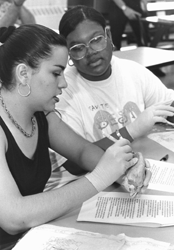
DNA Lab
by DO-IT Scholars, Emily and Jessica
DNA is a complex protein commonly called the "building block of life." In this activity we got an up-close look at the use and manipulation of DNA in the lab. The experiment we performed, called Agarose Gel Electophorese, is used in the comparison of DNA. We achieved this by injecting dyed plasmid (or engineered) DNA into a gel pack and then applying an electric current to force the DNA to spread. Before the DNA can be compared, the gel pack must be destained (or washed) in order to remove the excess dye. This activity was cool because not only did we get to perform the experiment, we could also pick up and feel everything.
Accessibility
by DO-IT Scholars, Amy, Shavonne, and Kimberlee
What exactly does the term "accessible" mean? What does it mean in public places? What does it mean for those with disabilities? In many situations, when something isn't accessible it is very difficult for people with physical impairments to function. There are lots of ways to make things accessible. For example, a wheelchair ramp can be built, Braille signs can be posted in areas around elevators for people who are blind, and visual signs displaying words can be above the restrooms in public places. The Americans with Disabilities Act and laws in many different states across the U.S. guarantee people with disabilities equal opportunities and the same rights as others. In conclusion, we would like to say that we hope public businesses are aware of the services needed for people with disabilities and make sure to provide them. And disabled people must be advocates for themselves.
Wheelchair Access: Rolling Around on Campus
by DO-IT Scholars, Nichole and Katrina
Have you ever traveled to a college and realized you can't get into a building because it's not wheelchair accessible? At the University of Washington, they try to make walkways and doorways wheelchair accessible. Although elevators are sometimes small, you can still get from floor to floor. At the UW there is always access to sidewalks, trails, doorways, and classrooms. Anyone who uses a wheelchair and wants to go to college should visit the campus in advance to check out whether it is accessible. Take the time to visit classrooms and find out how long it takes to go from one room to another.
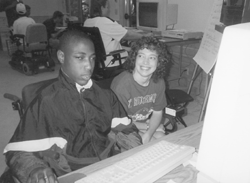
The DSS and You
by DO-IT Scholars, Justin and Michael
This year at DO-IT we not only had one presentation on the Disabled Student Services (DSS), but two. First we learned what DSS is. The second presentation was on how to approach DSS staff. The most important thing we learned is knowing who you are. Knowing who you are means knowing your strengths and weaknesses, your usual schedule and what you want to do with your life. College and university life is very different than high school and for the disabled it can be very difficult.
The disabled student services staff can be your best friend when it comes to accommodations. For example, Michael has learning disabilities. No one would know that he needs accommodations like computer use, extra time, special seating, and other accommodations. Justin, who has a physical disability, also needs extra time, special seating, computer use and much more. You need to approach the DSS office to request the accommodations you need. They can help you in many ways, like finding notetakers and getting other campus accommodations. They even can help you find a suitable dorm if you require one. In today's changing world you need to know your needs and present full documentation of your disabilities and accommodations. Contact the DSS prior to registration. It's your future. Make it a good one.
DO-IT Campers Learn to Surf
"Fun!" "Cool!" "Like a roller coaster!" "Great!"
What's the subject of all this praise? Summer camps, kids, and computers. Last summer, camps for kids with disabilities in Washington, Colorado, and Minnesota partnered with DO-IT to add computing, Internetworking and college/career prep to their list of activities. Over 400 campers at Camp Easter Seal West, the Muscular Dystrophy Association, the Northwest Burn Foundation, Camp Lots of Fun, and Funshine Day Camp in Washington state learned how to use computers, send email, explore the Internet, and play an online game or two. DO-IT staff visited several other camps to chat with campers about how to prepare for college and employment and how computer technology can play an important role in these pursuits. All campers of middle or high school age were encouraged to join the DO-IT Pals program, an electronic discussion group for students with disabilities who want to get a head start on preparing for college, work, and the transition to adulthood.
For the fourth year in a row, DO-IT director Sheryl Burgstahler traveled to Camp Courage in Minnesota with Ambassador Kris to offer an intensive computing and college preparation curriculum to eighteen campers. Advanced (returning) campers learned to write HTML and developed an interactive Web page with input from the other campers. Courage campers also got a realistic feel for college life by touring nearby St. Cloud University, roleplaying interactions with college faculty, and listening to the advice and experiences of successful college students with disabilities during panel presentations. Campers interacted with DO-IT Scholars, Ambassadors, Mentors, and staff via email.
Kris traveled to the Rocky Mountain Village Easter Seal Camp in Colorado where he engaged 50 campers in discussions about college preparation, work-based learning, and adaptive technology for computers. He also delivered a short Internet session for a small group of campers.
Next year, DO-IT will be expanding the Campers program within Washington state, and nationally. If you know of camps that serve students with disabilities and who would like to incorporate Internet and/or college or work preparation into their programs, contact the DO-IT office.
DO-IT Profiles
Here's your chance to learn more about the participants in DO-IT.
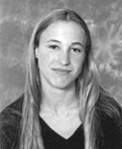
DO-IT Scholar Profile
by Jessie
I am now a Phase II Scholar. I attended the 1998 Summer Study. I live in Seattle, where I go to high school. My disability is dyslexia and ADD (Attention Deficit Disorder). I have struggled my entire life with dyslexia and was recently diagnosed with ADD. I am determined to succeed. In my free time, after studying and homework, I take ballet classes at Cornish college of the arts. In the summer, I enjoy sailing and in the winter, downhill skiing. I also run cross-country and track for my school. I love traveling, any kind of dance (however I am somewhat partial to avant garde), foreign languages and fashion. Of course I am totally into computers and new technology, because they are my life raft academically.
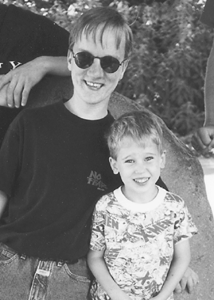
DO-IT Ambassador Profile
by Travis
Hi, my name is Travis and I just wanted to introduce/re-introduce myself. I joined the DO-IT program as a DO-IT Scholar back in 1994 when I was a junior in high school. I am originally from Monteview, Idaho. I graduated from high school, and went to a year of college at Utah State University in Logan, Utah. From August 1996 - 1998 I took a two-year hiatus from school and went on a mission for my church, the Church of Jesus Christ of Latter-day Saints. I went to Oklahoma City. I'm back in school now, in my sophomore year, studying Computer Science. I am adjusting back to school work. It is difficult, but I'm doing my best. My disability is I guess three-fold. I have orthopedic problems with my ankles, and wear ankle braces. I also have what might be termed Achondroplasia, a form of dwarfism. There are a lot of other things that limit me physically and health-wise. I can't keep up with everyone, I get tired easy, but life is fun. slt5v@cc.usu.edu
DO-IT Pal Profile
by Alani
My name is Alani and I am a high school junior in Idaho. I was born in Sandpoint and have always lived in Idaho with my parents and little brother. At school this year I have a full schedule with classes like biology II, math analysis (pre-calc), A.P. United States history, and honors English III. I am interested in the sciences, most specifically biology. Recently I have also wanted to learn theology and anthropology, though I am undecided as to what field I want to have a career in. After school every day I work at Panhandle State Bank in the bookkeeping department. Also, I enjoy volunteering for the local animal shelter and helping the animals there. In my spare time I like to read, watch TV and movies, be with my friends, and in the summer go biking, hiking, or swimming at one of the beaches nearby. I have CMT (Charcot-Marie-Tooth) muscular dystrophy and have attended MDA Camp Roger Larson for seven years now. It is always a joy to be at camp! Next year I hope to be a counselor. price@netw.coms
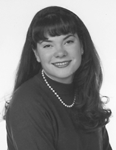
DO-IT 2-4 Profile
by Aimee Elber
My name is Aimee Elber and I have recently joined the doit2-4 electronic discussion list. I have a hearing impairment and wear hearing aides in both ears. My college education started out at Columbia Basin College in eastern Washington. In 1998 I transferred with an AA degree to Western Washington University in Bellingham. My major is special education. You may ask why I chose Western. Well, as I prepared to start applying to universities, I traveled around Washington state and visited campuses. This helped me get a better idea of what each school offered - I was able to visit certain departments, tour the campus, and look at the dorms. When I came to Western, I fell in love with the campus - the surrounding tree-covered mountains, the well-kept grounds, and the crisp, clean air typically found in the Northwest. I also liked the fact that Western is a small school and that there is a strong sense of community here. I found that there is an excellent education department here. Everything seemed to fall in place, and as a result - here I am.
My greatest hobby is reading, reading, and more reading. However, I have come to realize there isn't much leisure time left for reading, and I usually have my nose stuck in a textbook, rather than an interesting novel or biography. Other interests include quilting, American Sign Language, and working with disabled individuals. Since high school, my summers have been filled with either work or school. This summer, I will hopefully work at Meadowood Springs Speech and Hearing Camp located near Pendleton, Oregon. I was a staff member there in 1997 and I learned so much from the experience that I would like to go back again this year. ajelber@hotmail.com
DO-IT Mentor Profile
by Robert McKellar
Born in 1926, I underwent many surgeries to correct severe birth defects caused by spina bifida. Despite the odds, I not only survived but have filled my life with meaning and adventure. Upon graduation from the University of Portland in 1949, my teaching and counseling career took me to Oregon, Idaho, California, Hawaii and Japan. When I wasn't teaching or counseling, I traveled the world, flew my own airplane, and wrote letters to my mother. These letters are the basis for my first book, An Accident of Birth. My second literary effort, The Perfect Mirror, as yet unpublished, is a fictionalized account of my counseling experience at the California Medical Facility in Vacaville, California and San Quentin Prison. I retired in November 1990 and live in Davis, California where I am researching my third book, A Target Of Opportunity, which contrasts the wartime experiences of two families, one American and one Taiwanese.
DO-IT Staff Profile
by Kathy Cook
My name is Kathy Cook. I am the counselor/coordinator for the DO-IT efforts in the state of Washington. I have been involved with DO-IT for several years through membership on the advisory board and work during the summer programs. Prior to working with DO-IT, I was the Counselor for the University of Washington's Disabled Student Services (DSS) office. During the five years I worked for DSS I met with over 500 students with various types of disabilities. The opportunity to meet with so many students gives me insight into the difficulties that students with disabilities face when they attend college and the successful strategies they employ. I received a Bachelor of Arts degree in Human Services through Western Washington University's satellite program at Seattle Central Community College. I have a strong interest in American Sign Language, and have been signing for the past ten years. Additionally, I like to keep busy by volunteering at Children's Hospital and Regional Medical Center, and spending time with family and friends. I enjoy gardening, reading, camping and anything that has to do with beads!
Tech Tips: Netiquette
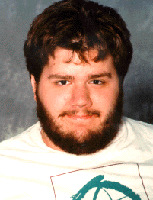
Netiquette is a series of "friendly" guidelines which everyone uses for politeness. There is not a strict code on most of the Net. What are the basic rules of netiquette? Below are some of the suggestions that I found at www.kaspersky.com/resource-center/preemptive-safety/what-is-netiquette
- General rule: don't be a jerk. If you use expletives every other word, or insult people, people are likely to ignore you (at least) or flame you (probably). One more note: even the intelligent inhabitants of mailing lists can be quick to anger. If you insult anyone intelligent, be prepared for a very humiliating public depantsing.
- Don't post in all caps. It infers YELLING.
- KISS-Keep It SHORT, Stupid! People have to download the whole thing, so don't make them mad.
- Your signature should be no more than 5 lines long.
- Mailing lists are created for a specific reason. If what you want to post isn't germane to the list, don't post it.
- Reply to posts regarding etiquette (net and otherwise) in private email.
Want a Job After Graduation? Get Some Experience Now!
Internships and other work-based learning experiences can help you choose careers, network with potential employers, select courses of study, develop job skills, and help pay for your education. In addition, they can give you valuable opportunities to practice disclosing your disability and requesting worksite accommodations.
Many high schools and colleges offer programs that help students gain work experience before graduation. Offerings vary from campus to campus. Do some research to find programs best suited to your needs. In addition, you can find opportunities and information on the Internet. To get started, visit the CAREERS section of the DO-IT Web site at www.washington.edu/doit/programs/accesscollege/employment-office/overview.
College students with disabilities pursuing technical careers should check out the ENTRY POINT! internship program coordinated through the American Association for the Advancement of Science (AAAS). This program provides opportunities for paid internships for undergraduate and graduate students with disabilities who are pursuing technical careers. 1999 summer internships typically run from May through August and are available throughout the country at NASA centers and in private industry. To be eligible for this program you must be a full-time college student; currently attend an accredited college or university with a major in computer science, engineering, mathematics, physical science, or life science; have a minimum B average; and have proof of eligibility to work in the United States.
If you are interested in applying, submit the following:
- letter of introduction including: 1) the type of assignment that best uses or builds upon your skills and work experience, 2) geographic restrictions (if any), and 3) a statement regarding citizenship
- resume
- description of any required work accommodation or assistive technology
- two letters of recommendation (one from faculty)
- copy of official transcript
- statement of U.S. citizenship
For more information on this exciting program, contact:
Laureen Summers
AAAS-Education and Human Resources
1200 New York Avenue, NW
Washington, DC 20005-3920
202-371-9849 (FAX)
202-326-6649 (voice/TTY)
lsummers@aaas.org
ehrweb.aaas.org/ehr
For assistance with developing a marketable resume and completing your application materials, please contact me, Julie Smallman, DO-IT CAREERS coordinator, at smallman@u.washington.edu.
The Thread: Speak Up...Just DO-IT!
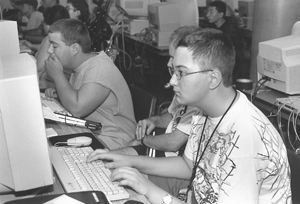
Many lively discussions appear on DO-IT electronic mail lists. The following excerpts are a small sample of the messages that were part of a discussion that began with the following message posted by Eric, a DO-IT Ambassador who is blind and joined the program as a Scholar in 1993.
- Hi all, I would like both students and mentors to comment on this issue. It seems as though people make a lot of false assumptions about the disabled. For example, they assume that just because someone is visually impaired means that they are not able to get around on their own. I have had this happen to me many times on the roads of town. Someone will tell me where to go or else get hold of me without talking at all and I don't have any idea who they are or where they are taking me. I think this is because they are assuming that I don't know where I am going just because I can't see. Do you all have the same problem? Do people make similar assumptions about other disabilities? Thanks. (Eric)
- Yes, that happens to me all the time, too. I assume that people are just trying to help. Their reasons are probably not always the same. People, for instance, tell me when it is ok to cross the street. Some may think I can't do it without their help. Others may just think that they might as well tell me the light is green since they happen to be there. (Sort of in the same manner in which someone might be nice and help someone else carry heavy shopping bags up the steps-not because they think the other person can't do it, but just because they want to help.") (Mentor who is blind)
- On my way into the bank, I had to walk across a parking lot where a truck was idling. So, I stopped and waited to see if the truck would move. A man walked up to me and asked me if I needed help. I told him why I was waiting, and that I wanted to go into the bank. He asked whether he could take my hand, and I replied that I'd take his arm. He said, "Good job. Once I did that with a woman and she hit me, so now I always ask first." So, I was able to show this person that he handled the situation correctly. ...Anyway, I don't mind people asking if they can help, as long as they don't grab me, or order me around, and if they can take "No, thanks, I'm fine" for an answer. (Mentor who is blind)
- ...I once got off a plane in Souix Falls and had a wheelchair waiting for me because I am deaf. [also]...over and over I am asked, "oh you are deaf, so do you know Braille?" Actually I do so I just say "yes indeed I know Braille"...but don't you wonder? Grin! I do think it is important to keep laughing...whew!! (Mentor who is deaf)
- Well, in my case, I usually ask some rather extreme question. I might say something like, "do you think I am braindead?" Most people say that this is too demanding and not a very good response. However, I think it is the way to go. (Ambassador who is blind)
- People definitely have odd reactions to people with disabilities. I use a wheelchair some of the time (like amusement parks and airports where there are long walks), and if there is ever anyone walking with me or pushing my wheelchair, others will always speak to the person that's with me, even if I'm who they're asking about. I feel like I must have a sign on that says "please ignore me, I'm temporarily unable to communicate." Oh well. (Scholar)
- As a hearing-impaired person, I am always running into people who see my hearing aids and assume they must shout at me (very uncomfortable if the aids are set at normal levels!). (Mentor)
- I think that as with any minority group, there is an unfortunate tendency to assume that all disabled people are like the one or a few that an outsider knows. Examples I have faced include assumptions that I must be: cold, tired, incapable of dealing with my needs when I'm cold or tired, asexual, uninvolved in my daughter's parenting, hard of hearing, incapable of comprehending what I hear, starved for touching (usually a pat on the head or shoulders), uninterested in athletic events in which I cannot compete myself, destined for an early grave, financially needy, desirous of being approached by strangers, one with a faulty memory, without appreciation of humor...I could go on ad nauseam. (Mentor with mobility impairment)
- Recently, as I was entering a restaurant, a mature lady said, "What's wrong with your legs?" (I have a spina bifida) I explained it was a birth defect in the lower spine. She replied, "I worked in a medical clinic for years and I have always felt so sorry for cripples." I hate the word "cripple." I worked 40 years in education and found it much easier to relate to the questions of young people as opposed to adults. During heated exchange of views with adults quite often the response is "but they are normal." Does this mean "abnormal" is the opposite of "normal"? I never thought of myself as "abnormal"-disabled, malfunctioning or handicapped perhaps, but never "abnormal." (Mentor)
- I choose what people I want to take the time to explain my disability to. I communicate with an electronic device, so it would take all of my energy to explain to everyone who looks cross-eyed at me. (Mentor with a mobility and speech impairment)
- Having CP, almost everyone assumes that I am mentally disabled, too. I get annoyed with this. Education is the key. For a long time, I yearned to "fit in." Young people today are wanting to stand out by coloring their hair (yellow, bright orange, etc.) and by wearing the "in" thing. I realized that I'm already there, and to accept my uniqueness. (Mentor)
- That reminds me of the professor who told me that I probably couldn't see the board very well from where I had sat down. Frankly, I can't see the board from wherever I sit down... This also makes me think of my friend who invited me to come to a silent movie with him. (Mentor who is blind)
- Human nature is to fear what society does not understand, so anything different is looked down upon, and this fear carries over into the way we are treated. My personal disability is Tourette's syndrome, as well as some symptoms of various other disorders, including coordination problems. People assume that since I obsess, and make facial movements and sounds that they consider to be strange, that I am some sort of a freak of nature that must be avoided. Luckily, I go to a relatively small school, so once people truly get to know me they overcome these hangups. (Scholar)
- One of my favorite stories was told to me by a DVR counselor who is deaf. He's driving through a drive-through window. He gets to the speaker and says, "hello, I'm deaf and won't be able to hear you. My order is... I can read lips so we can communicate when I get to the window..." All of a sudden this woman in the booth gets this "oh good, I'm trained for this, I know what to do" look on her face and runs out and gives the guy a Braille menu...in his car...he's driving. (Mentor with a mobility impairment)
- I am still laughing about that one...the thing is many of these people really have had training in how to "deal with us" different people, but we so rarely come along that when we do they are very eager to practice. (Mentor who is deaf)
- I have a visual impairment. Some people assume that I am also stupid. Not just blind. I will be at a friend of my brother's or somewhere, and someone will ask my brother what my name is. (Scholar)
- My personal opinion about disabilities is that everyone is disabled. It just so happens that there is a certain group whose disabilities are more obvious than others. I think that if people realized that in a sense we are all disabled, there would be no problem at all. (Scholar with mobility and visual impairments)
- I just wanted to tell you that these assumptions are very well put. However, I'd like to put another spin on the discussion by asking, "what can we do to change the negative assumptions that people make about people with disabilities?" We know they make the assumptions, so isn't the next step working to change some of the negative assumptions around? (Mentor with a mobility impairment)
- As people with disabilities I think we need to be assertive about what we need and don't need. If you're assertive you're making your needs politely, clearly known. Being demanding starts to cross over into being rude. (Mentor)
- Last year, I went on a cruise with my family. One night, after dinner, I went up on deck to write in my journal. After 10 minutes passed, a couple walked by and sat right by me. The husband asked, "is this English?" pointing to my chicken scratches. I automatically said "yes!" without thinking. The husband looked at his wife and said "mentally retarded." He assumed that I did not know the meaning of the phrase. Instead of walking away and getting mad, even though I wanted to throw him off the boat, I decided to use a different approach. I started to talk to him and his wife about where are you from and blah, blah... He and his wife were special education teachers from the Bay Area. I told him I was from the Bay Area and working for Intel. We talked for five minutes...I think they got the message that the label they put on me wasn't true. (Mentor with cerebral palsy)
- [some] people feel that because you have a visual impairment or other disability, you can't do normal tasks by yourself. I've even had people ask me if I wanted them to open my soda can for me. I think the best thing to do is to be assertive when people do something, or want to do something for you that you feel you can do for yourself. I think people are just trying to be helpful, and that they don't know for sure how much help, if any, they should give. (Scholar who is blind)
- ...and they will never know unless we tell them...Yes! The more often I do this the easier it becomes and the easier it becomes the more comfortable I am and that communicates it to the general population and makes them feel more comfortable and on and on and on...and somewhere in the midst of this is also the need to be both polite but also clear. It is up to us...and sometimes I feel 'YES!' And sometimes I feel 'Whew!' Because it does go on and on, day after day...strength to us all with a continued chuckle! (Mentor who is deaf)
- People are stupid. That's why we need to educate them. Speak up. That's the only way to change society's views and...never give up.
- The way to preempt or erase assumptions is to tell people what you need rather than letting them "act out" what they think you need. It is ok to say what you need help with. I think that is part of being independent. And just by being out and about and going after your normal business you also show people what you don't need help with. Actually, I think that we can never get rid of assumptions. After all, we all make assumptions based on our prior experience or inexperience. And even if a person has met someone with your disability, that other person may have had different abilities and needs than you do. For instance, people always assume that I access a computer using speech output, but I use a Braille display. The point is that communicating your needs is the best way to make everybody comfortable. (Mentor who is blind)
- [tell] people what you can do, too. Until a while ago, people including my patrons, doubted my wanting to work with games and graphics. I have a vision problem but so what. I'll give it a try and if I can't then I can't. I do want to give it the most effort I can, and it's worked quite well so far. People just say, "ok, let's let you try it" and I usually end up doing fine. Like this semester I wanted to take an art class. My instructor was new to teaching a lower level class, and she had no past experience with someone visually impaired. I guess you don't see low vision students enrolling in a drawing class too often, but I love the class and am doing fine. And if you have to walk slow, or take a closer look at something, go for it. Yeah, it feels weird sometimes, and I try to avoid it, but it helps a lot, because then if people do see you they know you are more capable than they might think. (Ambassador)
- That is a really good point. I can remember when I was working for Oregon Public Broadcasting in 1997. I wanted to set up a live show, which involved strong background knowledge of the control board. The station manager didn't think I could do this...[but he] gave me the opportunity to try it out and I was able to set up the show. The station manager was somewhat surprised...I guess that goes to show that it does not pay off to be a victim of other people's assumptions. (Ambassador who is blind)
- We don't have to be "victims" of other people's assumptions. We are only victims if we choose not to take charge of a situation. If you are blind and someone grabs your arm and pushes you across the street and you don't say anything, but would like to, then you are letting the other person force the result of his assumptions on you. If you, on the other hand, either say, "thank you, but I'll be fine" or "let me take your arm," depending on what you would like to do, then you are taking charge and aren't a victim. (Mentor who is blind)
- I think what people are trying to say here is that there is a difference between being the recipient of an act ("victimized") and allowing yourself to become overly affected by that act - i.e., to become a victim. (Mentor with mobility impairment)
- I agree with others about taking charge so that we are not "victimized" by other people's assumptions. When [a blind person] tells a bystander "thanks, but I don't need your help," the bystander learns (we hope!) that people with visual impairments don't always need help. And when I ask the airline staff at the gate to tell me what someone had just announced over the public address system (which I can't lipread, unfortunately), the airline staff person learns (again we hope!) that deaf people are capable of asking for help when they need it. So, by being assertive, we lead people to look at their perceptions of us and even change them from inaccurate ones to more accurate ones. (Mentor who is deaf)
- Along those same lines, when asking for help, you should be specific as to what you actually need so that the helper doesn't have to make assumptions. (Scholar who is blind)
- The more the general public sees us out and about, the more they will understand that we can, and want to, be independent. (Pal with mobility impairment)
- As a deaf person, I can relate to what others have said. I read lips and wear hearing aids. Sometimes people will speak much louder or exaggerate their lip movements to the point where I can't understand them at all. Or sometimes they speak so slowly, I fall asleep! Also, sometimes when I go tell a clerk or salesperson that I'm deaf, they start signing to me. And I'm sign-language illiterate! So that doesn't do me much good. But people are proud of their sign language skills, so I'm mostly amused and gently tell them that thanks, but they just need to talk in their accustomed way, and I'll understand them just fine- at least most of the time. If a man has a droopy moustache, heaven help me! (Mentor)
- Hi. I loved the droopy moustache note and agree completely! I will sometimes try to duck my head to look under to find the moving lips that I know are there somewhere! Grin! (Mentor who is deaf)
- I must say, this has been a fascinating discussion over the past few days. I have discovered lots about experiences of persons with disabilities...can I suggest that someone who writes well document the many points made in this discussion and write an article for a wide circulation publication such as Reader's Digest or one of the national Sunday newspaper supplement magazines?! I think the education of the non-disabled public that could result would be beneficial to everyone! (Mentor)
Well, at least you've read it in DO-IT News! Spread the word!
The Winning Equation: Access + Attitude = Success

People with disabilities are underrepresented in many challenging careers, including those in science, mathematics, technology, and engineering. Negative stereotyping and attitudes are reported as the most significant factors faced by people with disabilities in these fields. At the pre-college level students with disabilities are often discouraged from taking math and science courses and, when enrolled, are often not fully included in rigorous work in these classes. Poor high school preparation limits their options in college and careers.
To improve opportunities for students with disabilities in science, mathematics, technology, and engineering, DO-IT has launched a variety of programs. The DO-IT MATH-SCI project works with high school math and science teachers to help them fully include students with disabilities in their classes. It is funded by an Eisenhower grant. MATH-SCI stands for Making Accommodations that Help Schools Create Inclusion.
Conversations about disabilities in an educational setting are often dominated by the one-size-fits-all syndrome. Whether we are talking about a person who has a physical, sensory, learning, or cognitive disability, we like to have simple solutions that fit all. In truth, students with disabilities have the same variety of needs and preferences as anyone else. Although the energy and construction costs of every business could be cut dramatically by simply lowering all of the interior ceilings to a maximum height of 52 inches and this solution would work very well for many people who use wheelchairs or are of short stature, others might grumble when they have to maneuver on their knees as they move around the office. This kind of narrowly focused, inadequate, uniform solution is often imposed on the student with a disability, creating an educational environment that is counterproductive.
The MATH-SCI project has developed a model process and a Student Activities Profile form for creating effective accommodations in science and math classes. It can be used by any teacher and is composed of the following four steps:
Step #1: What does the task or assignment require?
Break down all of the components of the experiment, assignment, or exercise. As an educator, you are usually focused on the overall outcome of the project. To accommodate a student with a disability it's important to think about the specific settings, tools, skills, and tasks that are required at each step. By analyzing and evaluating the task thoroughly you will be able to determine how best to fully and effectively include a student with a specific disability.
Step #2: What physical, sensory, and cognitive skills are needed?
Match the tasks required to the physical, sensory, and cognitive skills needed to successfully complete the project. It is easy to say, "If I had a physical, sensory, or cognitive disability I would not be able to complete this assignment," without really determining what skills are needed for specific aspects of the project. We need to separate the "real" requirements of a specific task from the "fictional or perceived" requirements of the project in total. It is impossible to place yourself in the shoes of the student with a disability. They may have learned many ways to solve a specific problem or task and work around the limitations imposed by the disability.
Step #3: What components of the task require accommodation?
Once the task has been analyzed and the skills needed are identified, determine what accommodations may be required or how the learning experience might be altered to make it more accessible. Determine the level of difficulty of the project and determine how best to make an accommodation to create an inclusive environment for a student with a disability. It is very important to consult with the student to determine what they perceive as aspects of a project which they may need an accommodation or assistance.
Step #4: What accommodation options exist?
Now that the tasks that need accommodation have been determined, identify what resources exist for providing the needed accommodation(s). The student may have some good ideas, however, this is a time when other staff and professionals may have expertise in specific areas and be called on to provide input. In some cases, having students work in groups where each person is assigned a task that they have the ability to complete provides a reasonable alternative.
DO-IT MATH-SCI has created a brochure and videotape ($25) with the title, The Winning Equation: Access + Attitude = Success in Math and Science. In addition, made available through DO-IT are comprehensive program development materials titled Accommodating Students with Disabilities in Math and Science: A RESOURCE FOR TEACHERS ($70). Send a request and check to DO-IT to order these materials.
DO-IT Videotapes and Publications
As part of their Summer Study experiences, DO-IT Scholars contribute to the design and content of videotapes and publications. In this way they share with others what they are learning about using technology to communicate with others and access academic resources, succeeding in college, and participating in work-based learning experiences. They are also often the "stars" of videotape presentations created by DO-IT. DO-IT distributes its materials to those who wish to undertake similar activities or enhance existing school, post-secondary, and employment programs. DO-IT's videotapes and handouts are great for others to use in presentations at schools, meetings, and conferences. For all materials, permission is given to duplicate them for non-commercial purposes as long as the source is acknowledged. All DO-IT videos are open captioned and audio description versions are available.
Below is a list of our low-cost videotapes and comprehensive training materials. To order them, mark the products you wish to order and send these pages with a check to:
DO-IT
University of Washington
Box 354842
Seattle, WA 98195-4842
Videotapes
See DO-IT Videotape and Training Materials Order Form for current pricing info.
Comprehensive Training Materials
See DO-IT Videotape and Training Materials Order Form for current pricing info.
As The Web Turns
An atom walks into a bar in tears. The barman asks the atom, "Hey buddy, what's wrong?" "I've lost an electron," sobbed the atom. "Are you sure?" asked the barman. "I'm positive!" replied the atom.
The Browser: Calendar of Events
- ASHA (American Speech-Language Hearing Association)
- May 17-21, 1999
Sydney NSW
Speech-language conference. sppathau@vicnet.net.au
- 7th Annual Conference on Serving Adults with Learning Disabilities
- May 27, 1999
Farmington, CT
A conference for those who serve adults with learning difficulties. 860-524-4045; https://www.crec.org/ - 11th Annual Postsecondary Learning Disability Training Institute
- June 8-11, 1999
Burlington, VT
A training institute to assist professionals in meeting the needs of college students with learning disabilities and other hidden disabilities. 860-486-0273; http://vm.uconn.edu/~wwwpcse/pedu.htm
- ED-MEDIA/Ed-TELECOM '99
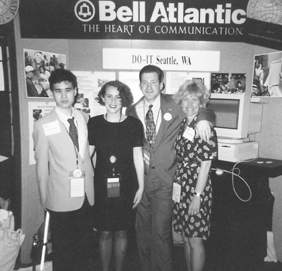
- June 19-24, 1999
Seattle, WA
"World Conference on Educational Multimedia/Hypermedia and Educational Telecommunications." 804-973-3987; http://www.aace.org/conf/edmedia/call99.html - NECC '99
- June 22-24, 1999
Atlantic City, NJ
"Spotlight on the Future" educational computing conference. 800-280-6218. necc99@atlantic.edu; https://ncce.org/ - AHEAD '99
- July 14-17, 1999
Atlanta, GA
Disability issues in higher education. 615-322-4705 (voice/TTY); patricia.a.pierce@vanderbilt.edu
- Closing the Gap '99
- October 19-23, 1999
Bloomington, MN
Technology and people with disabilities. 507-248-3294, ext.225; info@closingthegap.com; https://www.closingthegap.com/ - WebNet '99
- October 25-30, 1999
Honolulu, HI
WWW and the Internet. 804-973-3987; info@aace.org; https://www.aace.org/conf/elearn/future-past/
More About DO-IT
DO-IT News is published at the University of Washington with input from the staff, Pals, Scholars, Ambassadors, and Mentors of DO-IT. DO-IT is primarily funded by a grant from the National Science Foundation. To request more information.